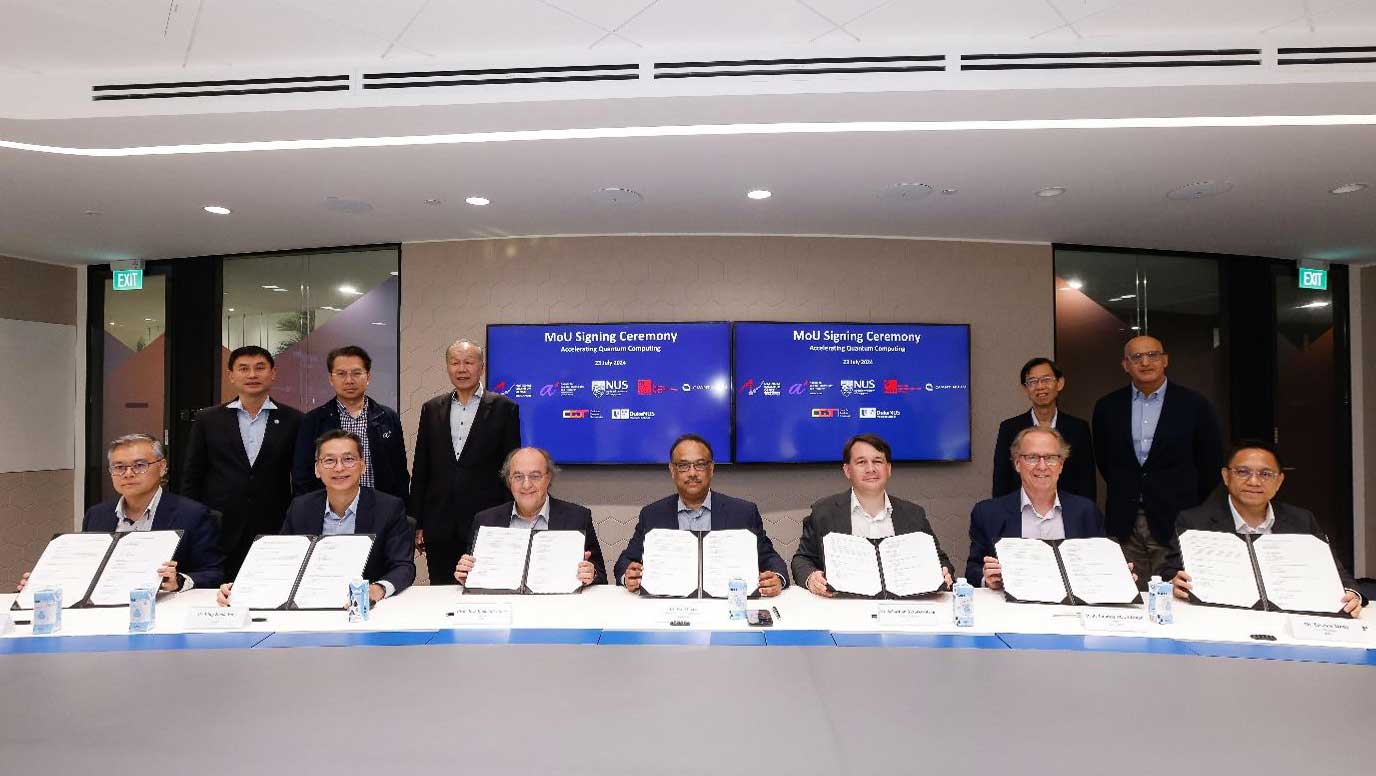Quantinuum wooed by Singapore QC chiefs in historic alliance

Singapore’s National Quantum Office (NQO), Agency for Science, Technology and Research (A*STAR), National University of Singapore (NUS), National Supercomputing Centre (NSCC) and Quantinuum have signed a significant MoU outlining the new strategy.
It grants access to Quantinuum’s advanced quantum computer and licence to explore and collaborate on quantum computing use cases focusing on computational biology.
The parties have agreed to leverage Quantinuum’s H-Series and Helios quantum computers to promote joint Research & Development activities in various quantum computing applications.
Helios is Quantinuum’s next generation quantum processor that could exponentially increase the computing power of quantum computers.
The parties will also collaborate on developing hybrid computing solutions that include both classical and quantum computing infrastructures, leading to the creation of long-term strategic roadmaps.
The MoU also enables collaborations in training and outreach through seminars, workshops and bespoke programmes to nurture quantum talent and contribute towards Singapore’s growing quantum community.
Singapore has a strong background in computational biology and the collection of quality health datasets. Through this MoU, scientists from A*STAR’s Bioinformatics Institute (A*STAR’s BII), the Centre for Quantum Technologies (CQT) at NUS and Duke-NUS Medical School’s Centre for Computational Biology will be able to leverage Quantinuum’s machines to enhance capabilities in modelling complex biological systems, advancing drug discovery and personalised medicine.
Quantinuum also plans to establish a dedicated R & D presence in Singapore; the rationale is that researchers from both Quantinuum and Singapore could better exchange knowledge and expertise for further developments in quantum applications and algorithms.
As the largest quantum computing company that has demonstrated success in building the highest performing quantum computers, Quantinuum offers an integrated, end-to-end quantum computing platform.
The company leverages trapped-ion technology – one of the most promising approaches for building the highest fidelity and scalable quantum computers – to develop use cases in a wide range of applications including pharmaceuticals, material sciences and finance.
This MoU is guided by Singapore’s National Quantum Strategy, which aims to strengthen Singapore’s position as a leading hub in the development and deployment of quantum technologies by bolstering scientific excellence in high impact areas of quantum research; strengthening Singapore’s engineering capabilities in quantum technologies to accelerate translation into real world solutions; attracting, developing and retaining quantum talent; and anchoring company partnerships to build a vibrant and resilient quantum industry.
NQO oversees the development and execution of Singapore’s National Quantum Strategy to advance Singapore’s quantum technologies, talent and ecosystem development through the national-level quantum programmes.
The National Quantum Computing Hub (NQCH), a national-level quantum programme and a joint initiative of CQT, A*STAR’s Institute of High Performance Computing (A*STAR’s IHPC) and the National Supercomputing Centre Singapore, will drive this collaboration with Quantinuum.
Ling Keok Tong, Executive Director, NQO said: “This is a strategic collaboration with Quantinuum following the launch of Singapore’s National Quantum Strategy in late May.
“Through the NQCH, the National Quantum Office has brought together key research performers to collaborate with Quantinuum on advancing R & D in quantum computing, which will give Singapore an edge in quantum use cases across various industries.
“Equally important, this MoU will give Singapore access to Quantinuum’s state-of-the-art H-Series and Helios quantum computers. The NQO will continue to foster mutually beneficial partnerships through our national-level quantum programmes and we look forward to delivering outcomes that could benefit the research, innovation and enterprise (RIE) ecosystem together.”
Dr Rajeeb (Raj) Hazra, CEO of Quantinuum, added: “Our collaboration underscores our commitment to advancing global quantum computing. By harnessing our cutting-edge H-Series quantum computers and leading quantum application software stack we aim to pioneer transformative use cases in computational biology and life sciences, catalysing innovation across industries.
“Establishing an R & D hub in Singapore enhances our dedication to fostering a vibrant quantum ecosystem, driving scientific excellence, and nurturing top quantum talent. Together, we aim to make significant strides in quantum technologies, supporting Singapore's ambition to lead in the rapidly evolving technological landscape.”
• Photograph (above) courtesy of Quantinuum:
From left to right, seated – Dr Su Yi, (A*STAR’s Institute of High Performance Computing); Mr Ling Keok Tong (National Quantum Office); Prof José Ignacio Latorre (Centre for Quantum Technologies); Dr Rajeeb Hazra (Quantinuum); Dr Sebastian Maurer-Stroh (A*STAR’s Bioinformatics Institute); Prof Thomas M. Coffman (Duke-NUS Medical School); Dr Terence Hung (National Supercomputing Centre Singapore).
From left to right, standing – Prof Tan Sze Wee (Biomedical Research Council, A*STAR); Prof Yeo Yee Chia (Innovation & Enterprise, A*STAR); Prof Low Teck Seng (National Quantum Steering Committee); Mr Quek Gim Pew (National Quantum Steering Committee); Mr Ilyas Khan (Quantinuum).


